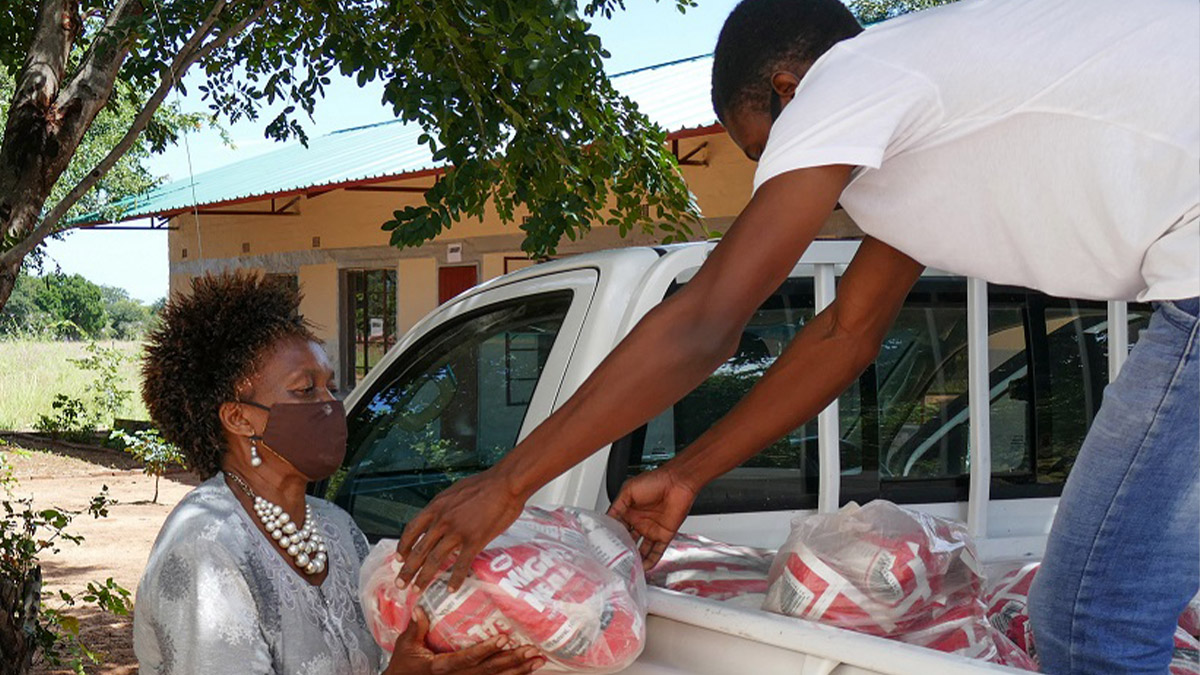April 2021 – After a one-year hiatus due to the COVID-19 pandemic, Zimbabwean schools are open again, and Children in the Wilderness (CITW), Wilderness Safaris’ non-profit partner, has provided two tonnes of nourishing porridge to primary schools in Matabeleland North province, ensuring each child has a nutritious start to the day.
Deliveries of the porridge took place between the 30th of March and the 7th of April, at St Mary’s, Dinde, Jabulani, and Lesedi primary schools, situated between Victoria Falls and Wilderness Safaris’ camps in Hwange National Park, resulting in 2 000 primary school children receiving an essential energy-packed breakfast for the next few weeks. The instant porridge, Mighty Meal, is made from 100% Zimbabwean-grown ingredients including white sorghum, nyimo beans (bambara nuts), groundnuts and baobab fruit powder, and simply requires hot water to prepare.
“We are so pleased that schools have now returned, and the children can get back to learning again. Furthermore, the importance of food cannot be underestimated, as it is impossible to learn anything on an empty stomach. The porridge makes such a difference to the children, helping them through the school day, and also easing some of the pressure on the parents. We are so grateful to the Grand Circle Foundation who provided the funding”, explains Sue Goatley, Children in the Wilderness Zambezi Programme Co-ordinator.
The porridge donation follows the 170 tonnes of food distributed by Wilderness Safaris and CITW between August 2020 and March 2021 to some of the most vulnerable families in the Zambezi region, still struggling with the devastating economic effects of the COVID-19 pandemic. A total of 4 191 food hampers have been handed over to date, positively impacting 17 000 community members. The hampers contain essential food items including maize meal, rice, peanut butter, sugar beans, salt, cooking oil, and soya chunks and will help to alleviate the pressure placed on household breadwinners, while providing much-needed sustenance to their dependants.
The latest round of donations, which took place in March, saw 506 hampers donated in Zimbabwe and 60 in Zambia. “With tourism being the predominant source of income in these villages, the challenges brought about by the pandemic have been particularly difficult, and have motivated us to raise crucial funds to help particularly vulnerable families,” notes Sue.
In another CITW initiative to further ensure food security, community members have also planted donated sorghum and millet seed at all the community and school gardens, which will make a significant difference to the school children’s and teachers’ lunch time meals. The early preparation of the gardens, worm beds and fertility trenches by the dedicated community members, coupled with the good rainfall received this year, promises to ensure a successful crop.
Additionally, CITW has been providing hygiene products as well as educational assistance in the form of student allowances since the onset of the pandemic. While Eco-Clubs and other school projects have had to wait for the resumption of schools, CITW has continued driving various other important empowerment initiatives during this time, such as the worm beds and fertility trenches. A community meeting hall was also completed in Jabulani, providing shelter for income-generating groups to gather and work on their projects, and to display and sell their products, once tourism resumes.
“As the future of our continent is in the hands of these young children, CITW’s efforts to support them, the communities themselves, the schools and other learners in the Zambezi region is as steadfast as ever, and we will continue to provide much-needed relief and a glimmer of hope during these turbulent times”, ends Sue.








